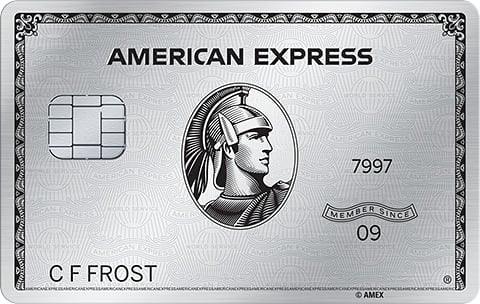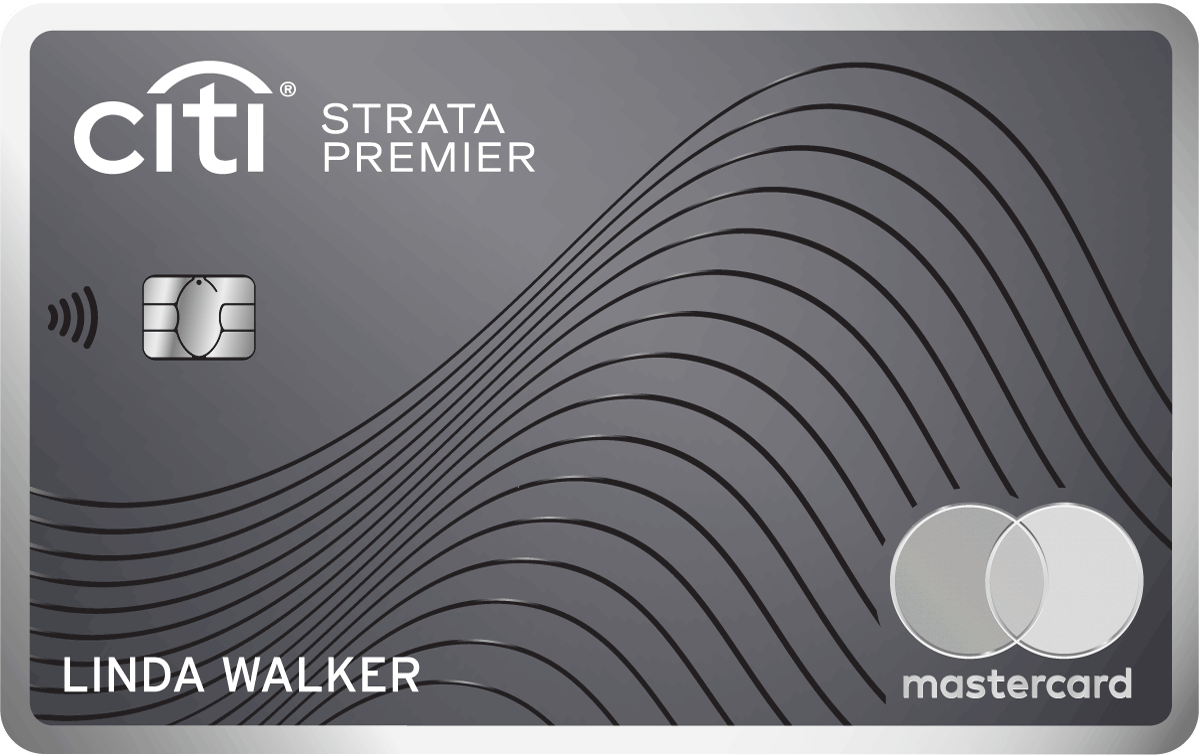What Are Carrier-Imposed Charges for Airlines and Should I Care?
These pesky charges can add hundreds of extra dollars to the cost of your award flight booking.

Many or all of the products on this page are from partners who compensate us when you click to or take an action on their website, but this does not influence our evaluations or ratings. Our opinions are our own.
Points and miles are a great way to travel cheaply, but if you’re not careful, your award ticket can come with steep airline fuel surcharges.
Here’s what you need to know to avoid the unpleasant surprise of big carrier-imposed surcharges on your next award flight.
What is a fuel surcharge?
A carrier imposed fee, or an airline fuel surcharge, is exactly what it sounds like — an extra charge on top of the cost of airfare, ostensibly to cover the cost of airline fuel.
When you buy a ticket with cash, fuel surcharges are not a big concern because airlines are required to advertise the full price that the consumer will pay. So the advertised cash price of a ticket includes the base fare, taxes and any fuel or other carrier-imposed surcharges.
Tickets purchased with miles or points, however, are another matter. On these award redemptions, many airlines will apply fuel surcharges on top of the mileage cost of the ticket. So if you want to use your American Airlines AAdvantage miles to fly business class from New York to London on British Airways, you could end up being charged 57,500 miles plus over $700 in cash each way.
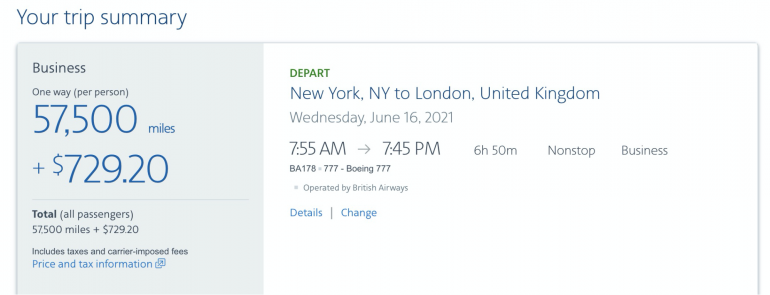
How they started
Decades ago, when the price of oil (and therefore airline fuel) drastically increased, airlines came up with the idea of adding fuel surcharges to help offset costs. But when the price of oil came back down, the fuel surcharges weren’t removed. Today, some airlines don't impose these fuel charges, whereas others vary, only charging them in certain cases.
Savvy travelers should take note of whether their award ticket will come with fuel surcharges and budget accordingly.
» Learn more: The best travel credit cards right now
Why do airlines charge them?
So, why do airlines charge fuel surcharges? Simple. They make the airlines money. It’s similar to how some airlines have unbundled fares and charge extra for things like seat assignments and baggage.

By signing up, you will receive newsletters and promotional content and agree to our Terms of Use and acknowledge the data practices in our Privacy Policy. You may unsubscribe at any time.
How to avoid fuel surcharges on award travel
Be on the lookout
To avoid fuel surcharges, the first step is to be aware that they exist — and that not all airlines charge them. Check out this example for using Alaska Airlines Atmos Rewards points to fly from New York to London:
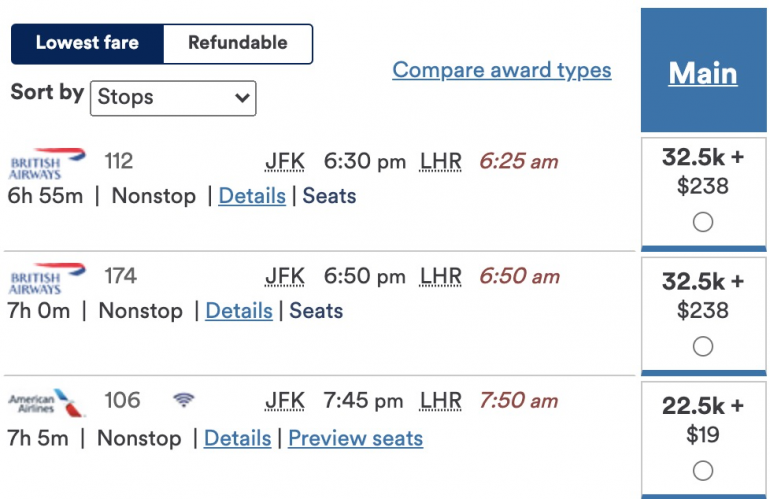
As you can see, flying on British Airways not only costs more miles but also includes hundreds of dollars in fuel surcharges, too. On the flip side, flying American Airlines will cost you fewer miles and less in fees.
Not all websites show this breakdown as clearly as Alaska does. So no matter what airline you’re flying or what miles you’re using, watch out for fuel surcharges when booking an award ticket.
Fiddle with dates and times
To know whether your airline or your specific route charges fuel surcharges, your best bet is to play around with sample bookings on the airline website. If you see a cash cost of hundreds of dollars in addition to the airline miles required, shop around to see whether those fuel surcharges could be avoided if you booked the ticket a different way.
For example, sometimes if you search Alaska Airlines for award flights from New York-JFK to London-Heathrow, your search results may turn up only a handful of options, all on British Airways and all with big fuel surcharges. Play around with dates to see if there are any fuel-surcharge-free partner options.
Use transferable points currencies to shop around
If you have Chase Ultimate Rewards®, American Express Membership Rewards, Citi ThankYou points or Capital One miles, they may be transferable to multiple airlines flying your route — some that impose fuel surcharges, some that don’t. Compare flights on multiple airlines’ websites.
Here are some cards to consider for earning transferrable points and miles:
Popular travel cards
Annual fee
$895.
$95.
$95.
$95.
Welcome offer
You may be eligible for as high as 175,000 Membership Rewards® Points after spending $12,000 in eligible purchases on your new Card in your first 6 months of Membership. Welcome offers vary and you may not be eligible for an offer. Terms apply.
LIMITED-TIME OFFER: Enjoy $250 to use on Capital One Travel in your first cardholder year, plus earn 75,000 bonus miles once you spend $4,000 on purchases within the first 3 months from account opening - that’s equal to $1,000 in travel.
Earn 75,000 bonus points after you spend $5,000 on purchases in the first 3 months from account opening.
Earn 60,000 bonus ThankYou® Points after spending $4,000 in the first 3 months of account opening, redeemable for $600 in gift cards or travel rewards at thankyou.com.
Earn rate
• 5 points per $1 on flights booked directly with airlines or through American Express, on up to $500,000 spent per year.
• 5 points per $1 on prepaid hotels booked through American Express.
• 1 point per $1 on other eligible purchases.
Terms apply.
• 5 miles per $1 on hotels, vacation rentals and rental cars booked through Capital One Travel.
• 2 miles per $1 on all other purchases.
• 5x points on all Chase Travel℠ purchases (exclusions apply).
• 5x on Lyft rides and Peloton equipment (for a limited time; terms apply).
• 2x points on all other travel.
• 3x points on dining, takeout and eligible delivery worldwide.
• 3x points for online grocery purchases (exclusions apply).
• 3x points on some streaming services.
• 1x point on all other purchases.
• 10 ThankYou® points per $1 spent on hotels, car rentals and attractions booked through Citi's travel portal.
• 3 points per $1 on air travel and other hotel purchases.
• 3 points per $1 on supermarkets.
• 3 points per $1 on gas stations and EV charging stations.
• 3 points per $1 on restaurants.
• 1 point per $1 on all other purchases.
Still not sure?
How different airlines handle fuel surcharges
Here’s a look at some guidelines for fuel surcharges for a few major domestic and international airlines.
United Airlines
United Airlines is one of the few airlines that doesn't charge any fuel surcharges, either on its own flights or those of its Star Alliance and other partners. There are also no fuel surcharges on United Airlines flights when booking with partners.
American Airlines
Booking a flight with American Airlines AAdvantage miles? You’ll encounter fuel surcharges on two of its partners: British Airways and Iberia. If you have the choice, book your transcontinental flight on American itself instead of these partners to save your cash.
If, on the other hand, you’re looking to use another airline’s miles to book a flight on American Airlines, there are no fuel surcharges.
Delta Air Lines
If you’re paying for your flight with Delta SkyMiles, prepare to pay the Delta Air Line's cargo fuel surcharge, whether your flight is on Delta itself or on one of its partner airlines.
One bright spot is that there are no fuel surcharges when flying within the United States.
» Learn more: Delta Air Lines versus United
Aeroplan
Air Canada’s Aeroplan program used to levy fuel surcharges on its own and several of its partners’ flights, but that changed in November 2020. The airline introduced a new Aeroplan program at the time, which no longer charges any carrier surcharges.
China Airlines
China Airlines has fuel surcharges on several routes. However, when using Delta SkyMiles to book a China Airlines flight to its hub in Taipei, there are no fuel surcharges.
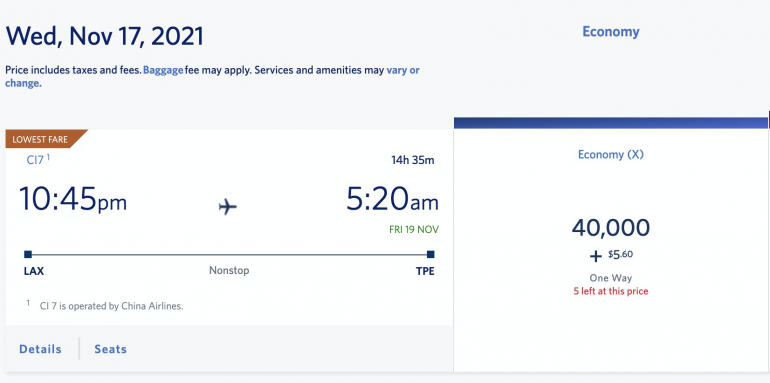
Japan Airlines
The Japan Airlines fuel surcharge appears when booking some of its partners' flights with JAL Mileage Bank miles. If you want to fly on Japan Airlines, you can do so without fuel surcharges by using American Airlines miles or Alaska Airlines points.
Singapore Airlines
Singapore Airlines doesn't charge fuel surcharges on its own flights. That means that you can use Singapore’s own KrisFlyer miles — or any partner miles — to fly Singapore Airlines without fuel surcharges. Singapore also doesn't pass along fuel surcharges from several of its partners, including United Airlines.
» Learn more: Top award sweet spots for KrisFlyer miles
Final thoughts on fuel surcharges
Every savvy traveler needs to know about carrier imposed fees. On a ticket paid for with cash, these fuel surcharges are less important since they're included in the displayed cost of the ticket. On an award ticket, however, they may be levied on top of the miles or points required for the ticket.
In some cases, fuel surcharges can be almost as much as the value of the miles you're redeeming. Be on the lookout for fuel surcharges and always look for flights on airlines and routes that don't charge them.
To view rates and fees of the American Express Platinum Card®, see this page.
How to maximize your rewards
You want a travel credit card that prioritizes what’s important to you. Here are some of the best travel credit cards of 2026:
- Flexibility, point transfers and a large bonus: Chase Sapphire Preferred® Card
- No annual fee: Wells Fargo Autograph® Card
- Flat-rate travel rewards: Capital One Venture Rewards Credit Card
- Bonus travel rewards and high-end perks: Chase Sapphire Reserve®
- Luxury perks: American Express Platinum Card®
- Business travelers: Ink Business Preferred® Credit Card
Article sources
NerdWallet writers are subject matter authorities who use primary,
trustworthy sources to inform their work, including peer-reviewed
studies, government websites, academic research and interviews with
industry experts. All content is fact-checked for accuracy, timeliness
and relevance. You can learn more about NerdWallet's high
standards for journalism by reading our
editorial guidelines.
Limited Time Only: Earn $1,000 Toward Travel!
Capital One Venture Rewards Credit Card 
Travel

For a limited time, the
Capital One Venture Rewards Credit Card is offering new cardholders an especially rich bonus: Enjoy $250 to use on Capital One Travel in your first cardholder year, plus earn 75,000 bonus miles once you spend $4,000 on purchases within the first 3 months from account opening - that’s equal to $1,000 in travel!
More like this
Related articles


